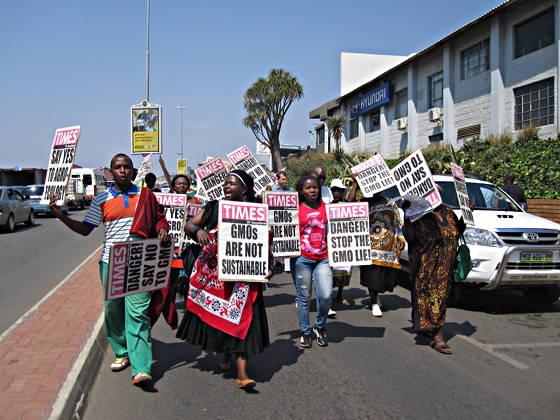Latest Resources

26 April 2019
Undermining farmers’ rights and seed systems: Why the EAC seed and plant varieties bill must be d...
In this vlog, African Centre for Biodiversity’s (ACB’s) Sabrina Masinjila, based in Tanzania, speaks about the East African Community Seed and Plant Varieties Bill, 2018 and some of the concerns related to the Bill, as more fully set out in a detailed report and summary. As described in the vlog and our detailed report, Concerns […]

10 September 2018
Report from SADC regional farmer speak out on farm input subsidy programmes
Rural Women’s Assembly (RWA) and African Centre for Biodiversity (ACB) jointly hosted a meeting of farmers and civil society organisations (CSOs) in August 2018 to share views and experiences on farm input subsidy programmes (FISPs) and public sector support for agroecology in the region. About 140 participants from Namibia, South Africa, Zimbabwe, Mozambique, Zambia, Malawi, […]

28 May 2018
Biosafety Indaba eSwatini: Unclear motives following approval to cultivate Bt cotton, despite dis...
The news that the Swaziland Environmental Authority (SEA) had authorised the importation and commercial release of Bt cotton seeds came as a huge shock to the African Centre for Biodiversity (ACB). It meant that ACB had to reconsider its earlier acceptance of an invitation by SEA to attend a National Biosafety Indaba on 22 May […]

18 October 2017
The GMO crisis in Swaziland
Swaziland is under enormous pressure to introduce genetically modified organisms (GMOs) into the country’s farming system. This pressure is coming not only from Monsanto but also from farmers and some sections of the public who have been fed a great deal of misinformation and hype by the pro-biotech machinery. The farmers, acting on incomplete and […]

18 July 2017
GM Cotton push in Swaziland: Next target for failed Bt cotton
This paper examines the application of the Bt cotton field trials currently underway in Swaziland. This is situated within the broader wave of GM application and trials across the continent, along with the weakening of national biosafety regulations, as part of the GM push across Africa. This paper is based on research on the Swaziland […]

12 May 2015
CAGJ Media Round-up
CAGJ Media Round-up March 23, 2015 Seattle and London Actions Protesting Seed Privatisation Meeting in London On March 23, 2015 the Bill and Melinda Gates Foundation (BMGF) and the United States Agency for International Development (USAID) sponsored a secret meeting in London to promote a recent report they commissioned detailing in clear terms how to […]

16 April 2013
Maíz transgénico de Sudáfrica: imposición en México y Zimbawe
BOLETÍN DE PRENSA Grupo ETC, Centro Africano para la Bioseguridad, FoodMattersZimbabwe y CTDT El Centro Africano para la Bioseguridad (ACB, African Center for Biosafety) manifiesta su alarma ante el hecho de que las autoridades sudafricanas dieron luz verde a la exportación de más de 25 mil toneladas de maíz transgénico hacia Zimbawe. Es la primera […]

15 April 2013
South Africa exports unapproved. GM maize to Zimbabwe, continues to export to Mexico, contaminati...
The ACB is deeply concerned by the news that the South African GMO authorities have permitted over 25,000 tons of GM maize to be exported to Zimbabwe. This is the first time that South African GM maize grains have been commercially exported to our neighbor north of the Limpopo, and adds to a growing list […]

9 March 2011
How US sorghum seed distributions undermine the FAO Plant Treaty’s Multilateral System
New data from ICRISAT and the US Department of Agriculture and a comparison of genebank records indicates that half of more of ICRISAT’s sorghum genebank collection is also being distributed outside of the Multilateral System. This yawning gap creates an economic incentive for the Multilateral System and its benefit-sharing requirements to be avoided. USDA’s sorghum […]

19 February 2011
Agrochemical giant DuPont to sell Bolivian sorghum gene
In 2012 multinational giant DuPont plans to begin selling sorghum varieties containing a valuable gene taken from a sudan grass that was collected in 2006 in Bolivia. The gene, branded as ‘Inzen A II’, makes sorghum plants tolerant to herbicides made by DuPont and other companies, and was acquired under exclusive license from Kansas State […]
